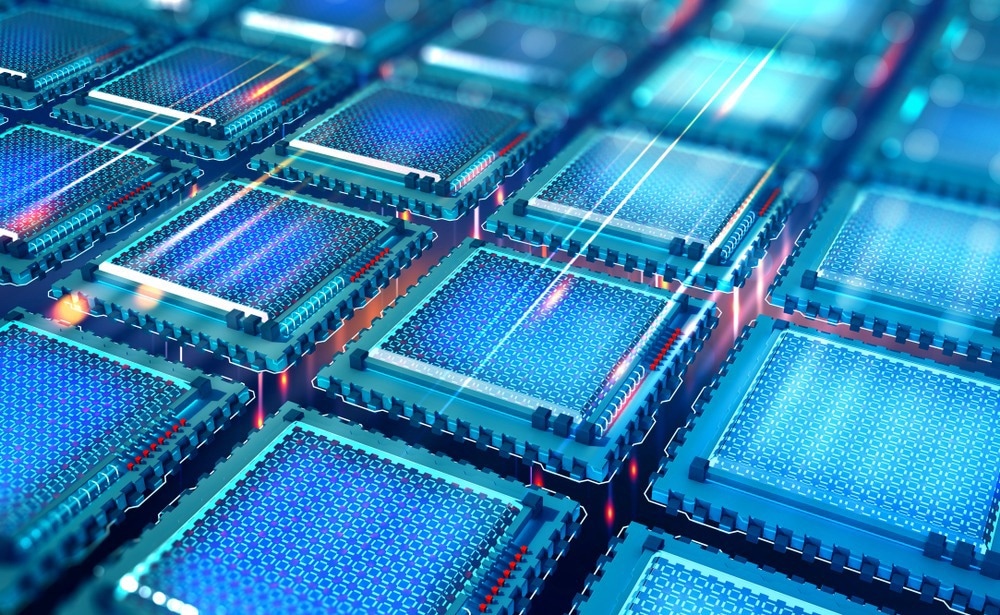Data is becoming increasingly crucial for businesses because it provides insight and proof of how resources may be used most effectively. Good data provides indisputable evidence: the more data, the better. However, because of the exponentially-growing amounts of data, laboratories now face numerous challenges. Is quantum computing part of the answer to address data challenges in science?
To discuss this topic, it is important to have a background on quantum computing and why it is preferred over classical computing to solve certain problems. We will also discuss the particular data challenges science faces to determine whether quantum computing could be the solution.

Image Credit: Yurchanka Siarhei/Shutterstock.com
What is Quantum Computing?
Computing power has increased trillion-fold since 1956, with computers becoming smaller and more powerful. Transistors, the basic building blocks of computation, are now 2 nm, smaller than a strand of DNA. Manufacturers are hitting the physical limits of how small they can go and thus how powerful computers can be.
To perform calculations, computers use bits, the basic unit of information. They can be either a 0 or a 1. Combinations of bits are used to store and express more complex information. Bits are represented through transistors that can be either on (1) or off (0). By combining transistors, we can form logic gates. A combination of logic gates will be able to perform simple operations, such as adding or multiplying two numbers.
As transistors get smaller, processors get more powerful. With more transistors, the processors can compute complex problems faster. However, a transistor is essentially a switch, allowing or blocking electrons. When they get too small, transistors cannot block electrons effectively. Yet, scientists have found a way of using this to their advantage.
Instead of bits, quantum computing uses qubits. In the quantum realm, qubits do not have to be either 0 or 1; they can be in any proportion of both states simultaneously. It is only when observed that it will be in a defined state. Therefore, 4 bits can be only one of 16 possibilities, and four qubits can be all of those at once.
With these characteristics, quantum computers can calculate many possibilities all at once. If used correctly, it can be vastly more efficient than classic computers. This is not to say that quantum computers are superior to standard computers per se. In some specific contexts, quantum computers will be incredibly useful, such as in cryptography, artificial intelligence, molecular simulations, or database searching.
What are the Data Challenges in Science?
The term “big data” has gained popularity in recent years. It defines large amounts of data, unstructured datasets, and/or huge data rates. Modern instruments and software generate more accurate data in amounts we did not believe were possible yesterday. In addition, although efficient, global collaboration in science between laboratories and disciplines generates immense data volumes.
Even with ever-growing memory capacities, keeping and storing this data is hard. It is especially challenging as the data sometimes needs to be made available to scientists anywhere around the globe. These two problems are typically solved thanks to the help of cloud computing.
Data also comes from various sources, which makes them unstructured. Therefore, exploiting such data is difficult, but this can be resolved using standardized workflows, laboratory information management systems, and digital interfaces.
Still, one problem persists. It is impossible for humans to sift through such large amounts of data and gain useful insights. The majority of data stays untouched or is not used to its full extent. That is when quantum computing comes into play.

Image Credit: paulista/Shutterstock.com
How Will Quantum Computing Help Us?
To search through a database, quantum does not need to look at every single entry, unlike normal computers. As a result, a quantum computer will only need the square root of the time taken by a standard computer, which is significantly less time, especially for sizable databases.
Trends and patterns in data are identified to reveal important insights. Nonetheless, classic computers struggle to keep up with the sheer amount of data. Especially in machine learning, computers are fed as much data as possible to learn and recognize patterns. Quantum computing needs much less time to analyze and interpret the data, providing relevant output much faster.
Quantum computers can project a problem into quantum space to gain new perspectives. As mentioned previously, this is used for machine learning and simulation. Quantum computers can simulate complex systems such as molecules’ properties or rail network planning faster and more accurately.
It is very unlikely that everyday computers will ever be run on quantum operating systems to browse the quantum web, but quantum computing marks an important milestone in the history of science. Quantum computing will enable scientists to get unprecedented insights and use the data they generate to its full extent.
Further Reading